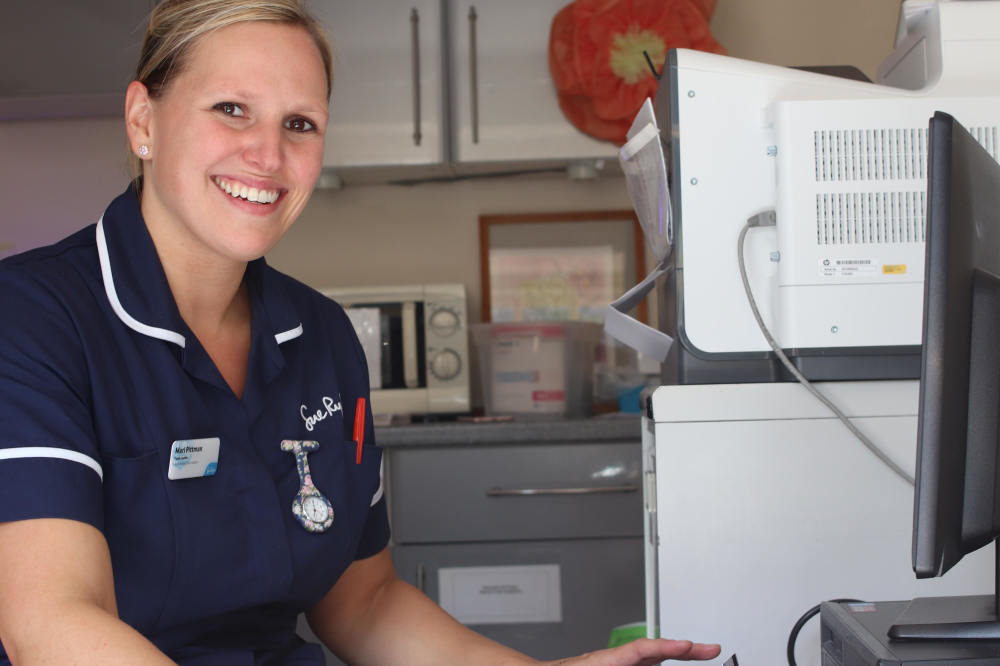Passionate about her career in palliative care, 34-year-old mum of two, Mari Pittman, is keen to dispel any negative connotations surrounding the care industry.

Mari Pittman
Although initially hesitant about entering the industry, after some encouragement from her mum Mari decided to make the move from private healthcare, to palliative care at Leckhampton Court Hospice - where she has been for the past 10 years, and “has never looked back”.
Despite her love for her job role, Mari finds it frustrating that for many, the mere mention of it can be quite the ‘conversation killer’.
When discussing her job, Mari says that she is often met with a sympathetic look and comments such as ‘oh that must be really sad’ – the unfortunate product of preconceived ideas about a dark and depressing hospice.
In light of this, Mari is eager to disprove the negative stereotypes which surround her line of work and ensure people understand just how rewarding working in this environment can be. In fact, Mari spends much of her day at Leckhampton Court Hospice “smiling, laughing and talking to the incredible patients”.
Mari’s day-to-day role involves her working alongside an incredibly supportive group of colleagues who all strive to provide the highest level of care for their patients. From managing staffing levels, to ensuring that the more complex patients have all the requirements and equipment they need – no two days are the same for Mari.
Mari explains:
“Many people might imagine that working in a hospice is all doom and gloom however, the energy at Leckhampton hospice is overwhelmingly positive. There are countless heart-warming stories and memories made at the hospice and I feel so lucky to have played a part in some of these.
“You feel like you’re doing something really worthwhile. We try our absolute hardest to go above and beyond for our patients as your end of life only happens once.
Helping patients to manage their symptoms, reassuring their families, and being able to provide vital care are some of my favourite elements of the job and unlike hospitals, we are able to be much more flexible with our patient care to make sure we offer the very highest standards. An example of this is that we can adapt drug rounds around patients – which helps to make patients feel comfortable and in control. We also try to fulfil all other requests they might have – both big and small!
There are so many moments I could share, but one of my very favourites involves our chef, who is also a talented pianist. She often selflessly spends time outside of work hours to play for the patients in the hospice chapel. She played for one of our patients – an elderly gentleman – who was a talented pianist himself and loved playing but hadn’t had the opportunity to in a long time. They managed to play together which we later found out meant a great deal to him. In fact, shortly after he passed away, we received a touching letter from his daughter to say how grateful she was because being able to play the piano had such a significant impact on her father.
The little touches like this is what makes Leckhampton Court Hospice and my job so incredibly special.”
Although there are many positive aspects to the job role, Mari also recognises that there can be emotional challenges when working in palliative care, and there are times when working in a hospice can offer a stark reality check:
“Dealing with death doesn’t get any easier, it is a challenge you’ll have to face no matter how long you have been in the job. All the staff build close relationships with the patients and their loved ones, so it goes without saying that once they pass away, it is very difficult.”
However, Mari feels that working within this industry for the past 10 years has given her a greater appreciation for life – particularly if they are treating someone who is of a similar age and stage in their life to her.
“It really puts things into perspective – you learn to let go of the silly little annoyances in life. I always tell myself, don’t be surprised if you get upset, we are human, and it would be unnatural to not feel upset. I try to remain as professional in front of relatives as possible but also show my empathy, but sometimes it can be difficult to get the balance right.
Sue Ryder recognise the challenges that come with our job and really support their staff. We regularly have ‘Reflective Practice’ where all staff come together to support one another – something I found particularly helpful when I experienced my first death in this job.”
Although there are understandably upsetting elements of her role, the highs far outweigh the lows. Mari wants to encourage anyone who might be considering going into palliative care to go for it, as nothing feels better than helping someone who is in more need than yourself.

